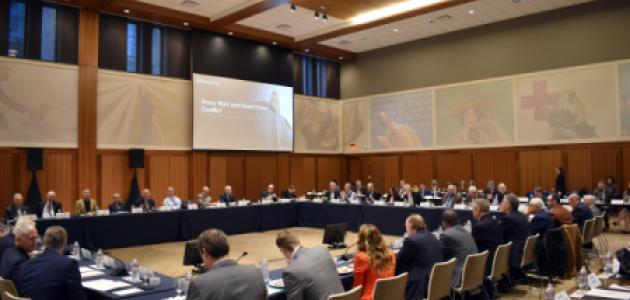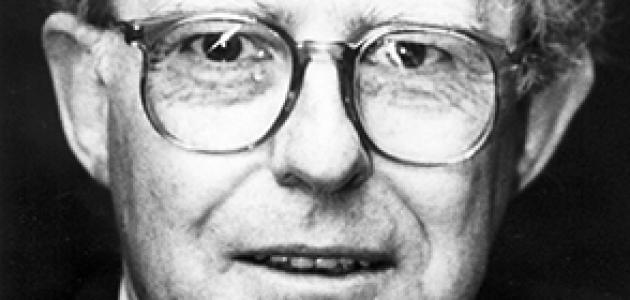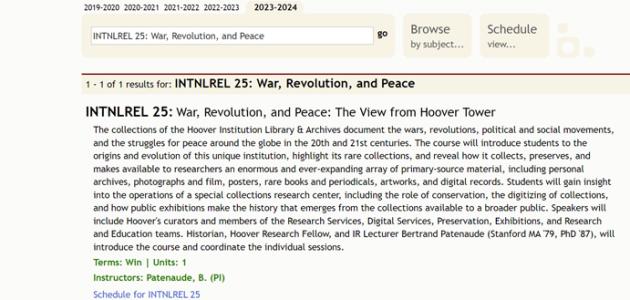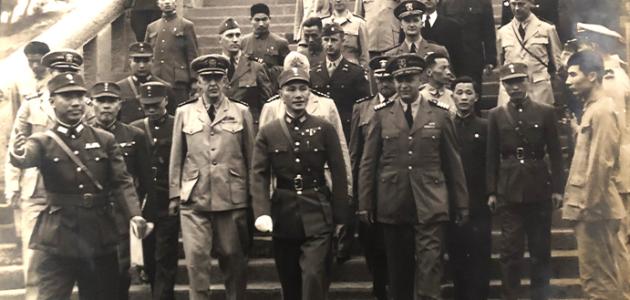Elena S. Danielson, whose distinguished career with the Hoover Institution spanned 27 years, and who was inspired to become an archivist at the age of 20, retired as associate director of the Hoover Institution and director of the Hoover Library and Archives on September 2.
"I had hoped, when I was 20, to retreat from the real world and into the archival world to study the lives and works of the hopeless romantics of history," Danielson told friends and coworkers who gathered on August 31 to wish her well. "However, I found myself on the cutting edge of history, not once but twice, here at Hoover," she said referring to political change that swept Eastern Europe beginning in 1989 and current political ferment in Taiwan.
On September 2, Danielson's new title will be "archivist emerita," and she will pursue her own research, focused on archives theory, building on her nearly three decades of "hands-on" experience.
Under her direction, the Archives at Hoover have grown and been augmented with collections which include correspondence of the Romanov family, the papers of poet and novelist Boris Pasternak, the papers of Soviet literary critic, dissident, and political prisoner Andrei Siniavskii, materials of Chiang Kai-shek and T. V. Soong in the T. V. Soong collection, and papers of German steel industry executive Dieter Spethmann on the process of European unification.
She recently was awarded the Society of American Archivists' 2005 Fellows' Ernst Posner Award for her article "Privacy Rights and the Rights of Political Victims: Implications of the German Experience" in the most recent volume, number 67, of the American Archivist.
She also received many other important awards for outstanding work in her field. In 2004, Danielson was awarded the National Order of Merit (rank of commander) of Romania for her "important role in the preservation and development of the extensive Romanian collections of the Hoover Archives, for her special support to Romanian researchers, and for donating copies of I. G. Duca's and Nicolae Titulescu's archival collections to Romanian cultural institutions."
In 2001, she received the Laurel Award of the Polish Prime Minister for her work with the Polish State Archives. Her research has been supported by Woodrow Wilson, Fulbright, and Whiting Fellowships. She is a member of Alpha Chapter of Phi Beta Kappa.
She was particularly proud of the educational service the archives could provide and strongly promoted the archival resources in her work with Stanford University undergraduates. She pioneered the use of archival sources in undergraduate research projects for 20 years, working with the History Department honors program, the Program in Writing and Rhetoric. As a result, about 40 percent of all Stanford freshmen visit the Hoover Archives for a workshop in using historical documents. She served as an undergraduate adviser at Stanford University (1992-97). She regularly provides programs for the Alumni Association reunions called "Classes with out Quizzes." In another outreach initiative she has co-taught classes on the Archives with Susan Wyle in the Continuing Studies Program. Dr. Danielson has also served on the Fulbright Committee.
Danielson has written for a number of academic and archival publications, such as Slavic Review, Vestnik Arkhivista, and American Archivist, and she has delivered papers on the holdings of the archives at conferences in Bulgaria, Germany, Poland, Romania, and Russia. She is a regular contributor to the Hoover Digest.
Recent publications include 1) "The Displaced Documents of Central Europe," forthcoming article in Comma, the official publication of the International Council on Archives; 2) "Privacy Rights and the Rights of Political Victims: Implications of the German Experience," published in The American Archivist, vol 67, nr 2 Fall/Winter 2004, this article won the Ernst Posner Prize in 2005; 3) "For Peace Alone Do I Ring: The Hoover Institution Carillon," Hoover, 2002; 4) "Nina Berberova and the Hoover Institution," a paper prepared for the conference "Colloque Nina Berberova Nina Berberova at 100," in Arles, France, in October 2001; 5) "Report on the Archives of Radio Free Europe in the Hoover Institution," a paper delivered at the conference "Dokumentacja archiwalna dotyczaca Rozglosni Polskiej RWE w zbiorach instytucji krajowych I zagranicznych," sponsored by the Polish State Archives, in Warsaw (June 2001); 6) "Bulgarian World War II Documentation in the Hoover Institution," a paper delivered at the conference "Second World War and the Balkans," sponsored by the Military Academy G. S. Rakovski, in Sofia, Bulgaria (June 2001); 7) "The Stasi Archives," a presentation for the American Library Association's annual meeting in San Francisco (June 2001).
She has been involved in interpretive archival exhibits at Hoover since 1979. In 1999 she worked with the Fine Arts Museums of San Francisco and the Guggenheim Museum of New York to present posters, photographs, and film clips revealing life in Paris during the German occupation of World War II.
The materials from the Hoover Institution provided historical context and filled the first room for the art exhibition Picasso and the War Years, which was seen by an estimated 500,000 visitors in San Francisco and New York. In conjunction with the exhibition, she gave a presentation at the California Palace of the Legion of Honor on using World War II documents as instructional materials in the classroom.
Earlier this year, she worked with the Iris & B. Gerald Cantor Center for Visual Arts and Stanford University professor Jeffrey Schnapp to develop a poster exhibition entitled "Revolutionary Tides," that opens on September 14 at Stanford. In 2006, it will travel to the Wolfsonian Museum in Florida.
She has worked with Stanford students in many departments, and developed special workshops on original research for the Stanford History Department and the Stanford program in Writing and Critical Thinking. She has been invited to give lectures about the holdings of the Hoover Archives at the American University in Paris and the Humboldt Universität in Berlin.
In 1999 Danielson was awarded a grant from the National Endowment for the Humanities to organize and microfilm the most important Russian émigré papers in the Museum of Russian Culture in San Francisco. The Hoover Archives holds use copies of the microfilm and has made the materials fully available for research for the first time. She has secured grants from the Osher Foundation and the Taube Family Foundation.
Danielson joined the nationally renowned Hoover Institution Archives in 1978, working in all areas of the organization: first in technical services, then reference, outreach, collection development, and then management.
After serving as acting archivist for one year 1996–97, she was named archivist September 1, 1997. She was made head of both the library and archives September 1, 2001, and then Associate Director of the Hoover Institution January 1, 2002.
With more than sixty million items, the Hoover archival collections constitute one of the world's largest repositories of materials on twentieth-century social, economic, and political change. The collections are organized into seven areas: Africa, the Americas, East Asia, East Central Europe, the Middle East, Russia/Commonwealth of Independent States, and Western Europe.
Before her Hoover appointment, Danielson was an assistant professor Santa Clara University and prior to that held a teaching fellowship at Stanford University. Danielson holds a Ph.D. and an A.M. degree in German studies from Stanford, a master's degree in library science and an undergraduate degree from the University of California, Berkeley.













